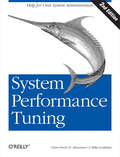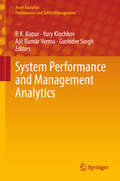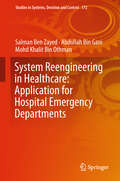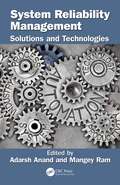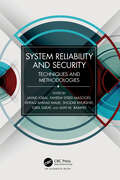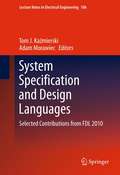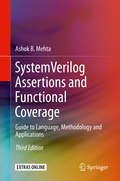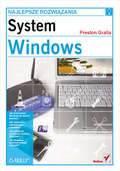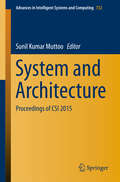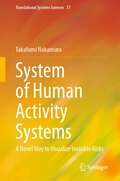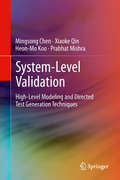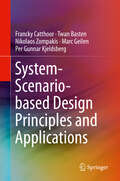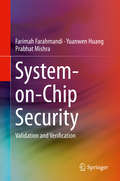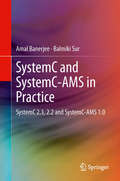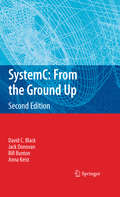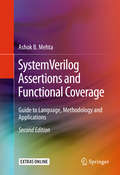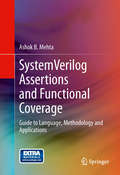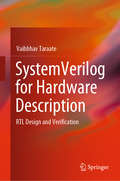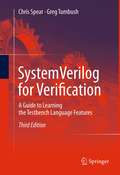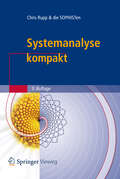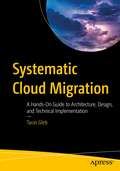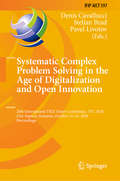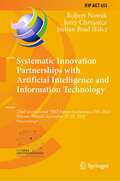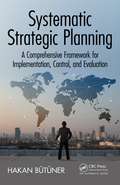- Table View
- List View
System Performance Tuning: Help for Unix Administrators
by Mike Loukides Gian-Paolo D. MusumeciSystem Performance Tuning answers one of the most fundamental questions you can ask about your computer: How can I get it to do more work without buying more hardware? In the current economic downturn, performance tuning takes on a new importance. It allows system administrators to make the best use of existing systems and minimize the purchase of new equipment. Well-tuned systems save money and time that would otherwise be wasted dealing with slowdowns and errors. Performance tuning always involves compromises; unless system administrators know what the compromises are, they can't make intelligent decisions.Tuning is an essential skill for system administrators who face the problem of adapting the speed of a computer system to the speed requirements imposed by the real world. It requires a detailed understanding of the inner workings of the computer and its architecture. System Performance Tuning covers two distinct areas: performance tuning, or the art of increasing performance for a specific application, and capacity planning, or deciding what hardware best fulfills a given role. Underpinning both subjects is the science of computer architecture. This book focuses on the operating system, the underlying hardware, and their interactions. Topics covered include:Real and perceived performance problems, introducing capacity planning and performance monitoring (highlighting their strengths and weaknesses). An integrated description of all the major tools at a system administrator's disposal for tracking down system performance problems. Background on modern memory handling techniques, including the memory-caching filesystem implementations in Solaris and AIX. Updated sections on memory conservation and computing memory requirements. In depth discussion of disk interfaces, bandwidth capacity considerations, and RAID systems. Comprehensive discussion of NFS and greatly expanded discussion of networking. Workload management and code tuning. Special topics such as tuning Web servers for various types of content delivery and developments in cross-machine parallel computing For system administrators who want a hands-on introduction to system performance, this is the book to recommend.
System Performance and Management Analytics (Asset Analytics)
by Ajit Kumar Verma P. K. Kapur Yury Klochkov Gurinder SinghThis book shares key insights into system performance and management analytics, demonstrating how the field of analytics is currently changing and how it is used to monitor companies’ efforts to drive performance.Managing business performance facilitates the effective accomplishment of strategic and operational goals, and there is a clear and direct correlation between using performance management applications and improved business and organizational results. As such, performance and management analytics can yield a range of direct and indirect benefits, boost operational efficiency and unlock employees’ latent potential, while at the same time aligning services with overarching goals.The book addresses a range of topics, including software reliability assessment, testing, quality management, system-performance management, analysis using soft-computing techniques, and management analytics. It presents a balanced, holistic approach to viewing the world from both a technical and managerial perspective by considering performance and management analytics. Accordingly, it offers a comprehensive guide to one of the most pressing issues in today’s technology-dominated world, namely, that most companies and organizations find themselves awash in a sea of data, but lack the human capital, appropriate tools and knowledge to use it to help them create a competitive edge.
System Reengineering in Healthcare: Application for Hospital Emergency Departments (Studies in Systems, Decision and Control #172)
by Salman Ben Zayed Abdullah Bin Gani Mohd Khalit Bin OthmanThis book presents an advanced systematic mapping review (SMR) and state-of-the-art taxonomy of emergency departments (EDs). Focusing on the patients’ level of fulfilment and how it can be enhanced, it examines existing problems like waiting periods and overcrowding and how these can be alleviated to provide a better service. The author examined research papers from 1964 to 2018, and developed six research questions, organising them using mapping studies, the primary objectives of which were firstly, to obtain a common understanding of the problems that need to be highlighted in EDs, and secondly, to re-analyse the methods used. Focusing on quality, the book encourages citations of experimental methods from important studies concerning EDs that can improve services. Through different research papers, various thematic areas in the healthcare sector were examined, like the determination of the relative efficiency of pre-discharge interventions; the analysis of care and managing common indications during the last stages of life; using e-Health to enhance effectiveness and proficiency; the seriousness of patient differences among EDs; the identification of quality problems in healthcare contexts; existing opportunities and the suggested plans. The book concludes that an analytical decision-making process should be used to assess a health technology on the basis of its performance. It stresses the importance of updating this analytical system frequently.
System Reliability Management: Solutions and Technologies (Advanced Research in Reliability and System Assurance Engineering)
by Mangey Ram Adarsh AnandThis book provides the latest research advances in the field of system reliability assurance and engineering. It contains reference material for applications of reliability in system engineering, offering a theoretical sound background with adequate numerical illustrations. Included are concepts pertaining to reliability analysis, assurance techniques and methodologies, tools, and practical applications of system reliability modeling and allocation. The collection discusses various soft computing techniques like artificial intelligence and particle swarm optimization approach for reliability assessment. Importance of differentiating between the optimal release time and testing stop time of the software has been explicitly discussed and presented in the book. Features: Creates understanding of the costs associated with complex systems Covers reliability measurement of engineering systems Incorporates an efficient effort-based expenditure policy incorporating cost and reliability criteria Provides information for optimal testing stop and release time of software system Presents software performance and security layout Addresses reliability prediction and its maintenance through advanced analytics techniques Overall, System Reliability Management: Solutions and Techniques is a collaborative and interdisciplinary approach for better communication of problems and solutions to increase the performance of the system for better utilization and resource management.
System Reliability and Security: Techniques and Methodologies
by Javaid Iqbal, Faheem Syeed Masoodi, Ishfaq Ahmad Malik, Shozab Khurshid, Iqra Saraf, and Alwi M. BamhdiBecause of the growing reliance on software, concerns are growing as to how reliable a system is before it is commissioned for use, how high the level of reliability is in the system, and how many vulnerabilities exist in the system before its operationalization. Equally pressing issues include how to secure the system from internal and external security threats that may exist in the face of resident vulnerabilities. These two problems are considered increasingly important because they necessitate the development of tools and techniques capable of analyzing dependability and security aspects of a system. These concerns become more pronounced in the cases of safety-critical and mission-critical systems. System Reliability and Security: Techniques and Methodologies focuses on the use of soft computing techniques and analytical techniques in the modeling and analysis of dependable and secure systems. It examines systems and applications having complex distributed or networked architectures in such fields as: ■ Nuclear energy ■ Ground transportation systems ■ Air traffic control ■ Healthcare and medicine ■ Communications System reliability engineering is a multidisciplinary field that uses computational methods for estimating or predicting the reliability aspects of a system and analyzing failure data obtained from real-world projects. System security is a related field that ensures that even a reliable system is secure against accidental or deliberate intrusions and is free of vulnerabilities. This book covers tools and techniques, cutting-edge research topics, and methodologies in the areas of system reliability and security. It examines prediction models and methods as well as how to secure a system as it is being developed.
System Specification and Design Languages
by Tom J. Kaźmierski Adam MorawiecThis book brings together a selection of the best papers from the thirteenth edition of the Forum on specification and Design Languages Conference (FDL), which was held in Southampton, UK in September 2010. FDL is a well established international forum devoted to dissemination of research results, practical experiences and new ideas in the application of specification, design and verification languages to the design, modelling and verification of integrated circuits, complex hardware/software embedded systems, and mixed-technology systems.
System Verilog Assertions and Functional Coverage: Guide to Language, Methodology and Applications
by Ashok B. MehtaThis book provides a hands-on, application-oriented guide to the language and methodology of both SystemVerilog Assertions and Functional Coverage. Readers will benefit from the step-by-step approach to learning language and methodology nuances of both SystemVerilog Assertions and Functional Coverage, which will enable them to uncover hidden and hard to find bugs, point directly to the source of the bug, provide for a clean and easy way to model complex timing checks and objectively answer the question ‘have we functionally verified everything’. Written by a professional end-user of ASIC/SoC/CPU and FPGA design and Verification, this book explains each concept with easy to understand examples, simulation logs and applications derived from real projects. Readers will be empowered to tackle the modeling of complex checkers for functional verification and exhaustive coverage models for functional coverage, thereby drastically reducing their time to design, debug and cover. This updated third edition addresses the latest functional set released in IEEE-1800 (2012) LRM, including numerous additional operators and features. Additionally, many of the Concurrent Assertions/Operators explanations are enhanced, with the addition of more examples and figures. · Covers in its entirety the latest IEEE-1800 2012 LRM syntax and semantics; · Covers both SystemVerilog Assertions and SystemVerilog Functional Coverage languages and methodologies; · Provides practical applications of the what, how and why of Assertion Based Verification and Functional Coverage methodologies; · Explains each concept in a step-by-step fashion and applies it to a practical real life example; · Includes 6 practical LABs that enable readers to put in practice the concepts explained in the book.
System Windows. Najlepsze rozwi?zania
by Preston GrallaSystem Windows. Najlepsze rozwišzania Jak dopasowa? Windows do swoich potrzeb? Jak optymalnie zabezpieczy? komputer?Jak zwi?kszy? wydajno?? systemu Windows?Jak zbudowa? domowe centrum rozrywki? Systemu Windows nie trzeba nikomu przedstawia?. Warto jednak zobaczy?, jak mo?na go udoskonali? i dostosowa? do swoich potrzeb. Dzi?ki tej ksiš?ce poznasz szerokie spektrum oprogramowania -- zarówno wbudowanego, jak i zewn?trznego, wraz z instrukcjami u?ycia -- przeznaczonego do modyfikacji oraz personalizacji obecnie u?ywanych systemów Windows. Ksiš?ka "System Windows. Najlepsze rozwišzania" nie jest skierowana do tych, którzy oczekujš zwyk?ych porad i wskazówek mówišcych, gdzie nale?y kliknš?, gdzie przecišgnš? myszš i jakie polecenia wpisa?. To propozycja kreatywnych rozwišza?, dzi?ki którym ka?dy u?ytkownik b?dzie móg? dostosowa? ten system operacyjny i wszystkie aplikacje oraz sprz?t, na którym dzia?ajš, w celu podniesienia komfortu i wydajno?ci swojej pracy. Po przeczytaniu tej ksiš?ki samodzielnie skonfigurujesz interfejs Aero w systemie Vista i utworzysz w?asne gad?ety paska bocznego, po czym uruchomisz je z nap?du USB. Dzi?ki szczegó?owym instrukcjom i wskazówkom krok po kroku zastosujesz przedstawione tu sposoby na optymalizacj? pracy z Windows. Znajdziesz tu równie? porady dotyczšce przeglšdarki Internet Explorer i pakietu biurowego Office 2007 oraz sprz?tu, takiego jak Zune czy router bezprzewodowy. W ksiš?ce znajdziesz sposoby m. in. na: szybsze uruchamianie i zamykanie systemu,wyszukiwanie i zarzšdzanie plikami w Eksploratorze Windows,rozwišzywanie problemów z Internet Explorerem,k?opoty z sieciš,optymalizacj? poczty elektronicznej,zapewnianie bezpiecze?stwa i kontroli kont u?ytkowników,wykorzystanie grafiki i multimediów, podnoszenie wydajno?ci systemu.Uwolnij ca?y potencja? drzemišcy w systemie Windows!
System and Architecture: Proceedings of CSI 2015 (Advances in Intelligent Systems and Computing #732)
by Sunil Kumar MuttooThis book comprises the select proceedings of the annual convention of the Computer Society of India. Divided into 10 topical volumes, the proceedings present papers on state-of-the-art research, surveys, and succinct reviews. The volumes cover diverse topics ranging from parallel processing to system buses, and from computer architecture to VLIW (very long instruction word). This book focuses on systems and architecture. It aims at informing the readers about those attributes of a system visible to a programmer. This book also deals with various innovations and improvements in computing technologies to improve the size, capacity and performance of modern-day computing systems. The contents of this book will be useful to professionals and researchers alike.
System of Human Activity Systems: A Novel Way to Visualize Invisible Risks (Translational Systems Sciences #37)
by Takafumi NakamuraThis book has unique features that set it apart from conventional books on the prevention of system failures in that it provides a method that views human activities from a meta-methodological perspective based upon an inter-disciplinary understanding of human activities. With these characteristics, the book also proposes a common methodological basis to apply to various problems surrounding society today such as an aging social infrastructure; the safety of food, medicine, and public transportation; and the creation of sustainable electricity and cybersecurity. Furthermore, since the failure of human activities is expressed in a three-dimensional space and the topological metrics are implemented, the failure trajectories can be quantitatively monitored in time series to take effective preventive measures. Considering the implementation of the topological metrics, the causes of each failure are classified into two dimensions of the degree of coupling between system elements and the interaction between the target system and the external environment. Owing to the nature of the introduction of topological metrics, all individual and diverse systems can share general topological metrics. Consequently, understanding various failures over cross-industries is possible with the use of common meta-systemic language and mutual learning between different industries, and the solution of social problems can be effectively achieved. A system of system failures (SOSF) proposed and confirmed the effectiveness of this meta-methodology for information and communication technologies (ICT) systems and the SOSF is extended to human activity systems (SOHAS: system of human activity systems) as a whole. Therefore, the SOHAS becomes an academic foundation for theoretical research on meta-methodology, and it has an impact on practitioners to prevent system failures by accumulating knowledge of failures and learning from other industries.
System-Level Validation
by Prabhat Mishra Heon-Mo Koo Xiaoke Qin Mingsong ChenThis book covers state-of-the art techniques for high-level modeling and validation of complex hardware/software systems, including those with multicore architectures. Readers will learn to avoid time-consuming and error-prone validation from the comprehensive coverage of system-level validation, including high-level modeling of designs and faults, automated generation of directed tests, and efficient validation methodology using directed tests and assertions. The methodologies described in this book will help designers to improve the quality of their validation, performing as much validation as possible in the early stages of the design, while reducing the overall validation effort and cost.
System-Scenario-based Design Principles and Applications
by Francky Catthoor Twan Basten Nikolaos Zompakis Marc Geilen Per Gunnar KjeldsbergThis book introduces a generic and systematic design-time/run-time methodology for handling the dynamic nature of modern embedded systems, without adding large safety margins in the design. The techniques introduced can be utilized on top of most existing static mapping methodologies to deal effectively with dynamism and to increase drastically their efficiency. This methodology is based on the concept of system scenarios, which group system behaviors that are similar from a multi-dimensional cost perspective, such as resource requirements, delay, and energy consumption. Readers will be enabled to design systems capable to adapt to current inputs, improving system quality and/or reducing cost, possibly learning on-the-fly during execution.Provides an effective solution to deal with dynamic system designIncludes a broad survey of the state-of-the-art approaches in this domainEnables readers to design for substantial cost improvements (e.g. energy reductions), by exploiting system scenariosDemonstrates how the methodology has been applied effectively on various, real design problems in the embedded system context
System-on-Chip Security: Validation and Verification
by Prabhat Mishra Farimah Farahmandi Yuanwen HuangThis book describes a wide variety of System-on-Chip (SoC) security threats and vulnerabilities, as well as their sources, in each stage of a design life cycle. The authors discuss a wide variety of state-of-the-art security verification and validation approaches such as formal methods and side-channel analysis, as well as simulation-based security and trust validation approaches. This book provides a comprehensive reference for system on chip designers and verification and validation engineers interested in verifying security and trust of heterogeneous SoCs.
SystemC and SystemC-AMS in Practice
by Amal Banerjee Balmiki SurThis book describes how engineers can make optimum use of the two industry standard analysis/design tools, SystemC and SystemC-AMS The authors use a system-level design approach, emphasizing how SystemC and SystemC-AMS features can be exploited most effectively to analyze/understand a given electronic system and explore the design space. The approach taken by this book enables system engineers to concentrate on only those SystemC/SystemC-AMS features that apply to their particular problem, leading to more efficient design. The presentation includes numerous, realistic and complete examples, which are graded in levels of difficulty to illustrate how a variety of systems can be analyzed with these tools.
SystemC: From the Ground Up, Second Edition
by David C. Black Bill Bunton Jack Donovan Anna KeistSystemC provides a robust set of extensions to the C++ language that enables rapid development of complex models of hardware and software systems. The authors focus on practical use of the language for modeling real systems, showing: A step-by-step build-up of syntax Code examples for each concept Over 8000 lines of downloadable code examples Updates to reflect the SystemC standard, IEEE 1666 Why features are as they are Many resource references How SystemC fits into an ESL methodology This new edition of an industry best seller is updated to reflect the standardization of SystemC as IEEE 1666 and other improvements that reflect feedback from readers of the first edition. The wide ranging feedback also include suggestions from editors of the Japanese and Korean language translations, professors and students, and computer engineers from a broad industrial and geographical spectrum, all who have successfully used the first edition. New chapters have been added on the SystemC Verification Library and the Transaction Level Modeling, and proposed changes to the current SystemC standard. David Black and Jack Donovan, well known consultants in the EDA industry, have teamed with Bill Bunton and Anna Keist, experienced SystemC modeling engineers, to write the second edition of this highly popular classic. As a team the authors bring over 100 years of ASIC and system design experience together to make a very readable introduction to SystemC.
SystemVerilog Assertions and Functional Coverage
by Ashok B. MehtaThisbook provides a hands-on, application-oriented guide to the language andmethodology of both SystemVerilog Assertions and SystemVerilog FunctionalCoverage. Readers will benefit from the step-by-step approach to functionalhardware verification using SystemVerilog Assertions and Functional Coverage,which will enable them to uncover hidden and hard to find bugs, point directlyto the source of the bug, provide for a clean and easy way to model complextiming checks and objectively answer the question 'have we functionallyverified everything'. Written by a professional end-user of ASIC/SoC/CPU andFPGA design and Verification, this book explains each concept with easy tounderstand examples, simulation logs and applications derived from realprojects. Readers will be empowered to tackle the modeling of complex checkersfor functional verification, thereby drastically reducing their time to designand debug. This updated second edition addresses the latest functional set releasedin IEEE-1800 (2012) LRM, including numerous additional operators and features. Additionally, many of the Concurrent Assertions/Operators explanations areenhanced, with the addition of more examples and figures. #65533; Covers in its entirety the latest IEEE-1800 2012 LRM syntax and semantics; #65533; Covers both SystemVerilog Assertions and SystemVerilog Functional Coverage language and methodologies; #65533; Provides practical examples of the what, how and why of Assertion Based Verification and Functional Coverage methodologies; #65533; Explains each concept in a step-by-step fashion and applies it to a practical real life examp≤ #65533; Includes 6 practical LABs that enable readers to put in practice the concepts explained in the book.
SystemVerilog Assertions and Functional Coverage: Guide to Language, Methodology and Applications
by Ashok B. MehtaThis book provides a hands-on, application-oriented guide to the language and methodology of both SystemVerilog Assertions and SytemVerilog Functional Coverage. Readers will benefit from the step-by-step approach to functional hardware verification, which will enable them to uncover hidden and hard to find bugs, point directly to the source of the bug, provide for a clean and easy way to model complex timing checks and objectively answer the question 'have we functionally verified everything'. Written by a professional end-user of both SystemVerilog Assertions and SystemVerilog Functional Coverage, this book explains each concept with easy to understand examples, simulation logs and applications derived from real projects. Readers will be empowered to tackle the modeling of complex checkers for functional verification, thereby drastically reducing their time to design and debug.
SystemVerilog for Hardware Description: RTL Design and Verification
by Vaibbhav TaraateThis book introduces the reader to FPGA based design for RTL synthesis. It describes simple to complex RTL design scenarios using SystemVerilog. The book builds the story from basic fundamentals of FPGA based designs to advance RTL design and verification concepts using SystemVerilog. It provides practical information on the issues in the RTL design and verification and how to overcome these. It focuses on writing efficient RTL codes using SystemVerilog, covers design for the Xilinx FPGAs and also includes implementable code examples. The contents of this book cover improvement of design performance, assertion based verification, verification planning, and architecture and system testing using FPGAs. The book can be used for classroom teaching or as a supplement in lab work for undergraduate and graduate coursework as well as for professional development and training programs. It will also be of interest to researchers and professionals interested in the RTL design for FPGA and ASIC.
SystemVerilog for Verification
by Chris Spear Greg TumbushBased on the highly successful second edition, this extended edition of SystemVerilog for Verification: A Guide to Learning the Testbench Language Features teaches all verification features of the SystemVerilog language, providing hundreds of examples to clearly explain the concepts and basic fundamentals. It contains materials for both the full-time verification engineer and the student learning this valuable skill. In the third edition, authors Chris Spear and Greg Tumbush start with how to verify a design, and then use that context to demonstrate the language features, including the advantages and disadvantages of different styles, allowing readers to choose between alternatives. This textbook contains end-of-chapter exercises designed to enhance students' understanding of the material. Other features of this revision include: New sections on static variables, print specifiers, and DPI from the 2009 IEEE language standardDescriptions of UVM features such as factories, the test registry, and the configuration databaseExpanded code samples and explanations Numerous samples that have been tested on the major SystemVerilog simulatorsSystemVerilog for Verification: A Guide to Learning the Testbench Language Features, Third Edition is suitable for use in a one-semester SystemVerilog course on SystemVerilog at the undergraduate or graduate level. Many of the improvements to this new edition were compiled through feedback provided from hundreds of readers.
Systemanalyse kompakt
by Chris Rupp Sophist GmbhSystemanalyse kompakt zeigt Ihnen die Schwerpunkte der Anforderungsanalyse im Rahmen der Software- und Systemanalyse auf. Die Anforderungsanalyse bildet das Fundament eines jeden Systementwicklungsprojektes und entscheidet daher maßgeblich über Erfolg oder Misserfolg Ihres Projektes. Gerade in der Analysephase eröffnet sich Ihnen das Potenzial zur effizienten und zielorientierten Beeinflussung der Systementwicklung: Erstellen Sie eine vollständige und eindeutige Anforderungsdefinition, bei der Aufwand und Ergebnis in optimalem Verhältnis zueinander stehen. Dabei hilft Ihnen Systemanalyse kompakt. Das Buch bringt die Haupttätigkeiten der Systemanalyse auf den Punkt. Dabei vermittelt es mit den vom International Requirements Engineering Board festgelegten Begriffen, Definitionen und Zusammenhängen neben grundlegenden organisatorischen Rahmenbedingungen zahlreiche pragmatische Ansätze, wie Sie das grundlegend notwendige Wissen - umfassend ermitteln, - verständlich dokumentieren, - effektiv verwalten - und angemessen prüfen. Lösungsvorschläge zu konkreten Problemen der Systementwicklung und praxiserprobte Tipps unterstützen Sie bei Ihrer täglichen Arbeit. So können Sie dafür sorgen, dass die Anforderungen an ein System von allen Projektbeteiligten verstanden und verwirklicht werden können.
Systematic Cloud Migration: A Hands-On Guide to Architecture, Design, and Technical Implementation
by Taras GlebThis book is your systematic cloud migration guide. Experiences shared by the author are drawn from real-life migration projects and contain practical advice, as well as step-by-step architecture, design, and technical implementation instructions using sample application code on GitLab. Following the guidance in this book will provide much needed support to your teams, and help you successfully complete the application cloud migration journey. Systematic Cloud Migration consists of four major parts. Part one starts with a fundamental introduction of cloud computing to establish the context for migration, including paradigm changes in five important areas: software application, DevSecOps, operations, infrastructure, and security. And these are the areas that the book follows throughout. Next, it introduces a real-life migration process that your team can follow. Part two presents the migration process for the application code, including architecture diagrams and presented by demo application code and supporting infrastructure in AWS cloud. Part three dives into DevSecOps and automation. In addition to concepts, a real-life migration diagram and sample pipeline code implemented with GitLab are include. Part four deals with efficient cloud operations. Each chapter has a practical structure: objectives, roles, inputs, process/activities, outputs/deliverables, best practices, and summary. There is a wealth of cloud production-grade template style artifacts that can be used as is. What You Will Learn Design applications in the cloud, including determining the design criteria (e.g., solution cost is a design criterion, same as security, and is not an afterthought)Understand the major migration areas: software development (application code, data, integration, and configuration), software delivery (pipeline and automation), and software operations (observability)Migrate each application element: client and business components code, data, integration and services, logging, monitoring, alerting, as well as configurationsUnderstand cloud-critical static application security testing (SAST), dynamic application security testing (DAST), containers compliance and security scanning, and open source dependency testingKnow the directions and implementation details on cost-efficient, automated, cloud-native software operations Who This Book Is For Primarily designed with software developers, team leads, development managers, DevOps engineers, and software architects in mind. Their day-to-day activities include architecting, designing, developing, delivering, and operating software in the cloud environment. In addition, this book will benefit infrastructure, network, security, and operations engineers, who in turn, can provide better support for the software development product teams.
Systematic Complex Problem Solving in the Age of Digitalization and Open Innovation: 20th International TRIZ Future Conference, TFC 2020, Cluj-Napoca, Romania, October 14–16, 2020, Proceedings (IFIP Advances in Information and Communication Technology #597)
by Denis Cavallucci Stelian Brad Pavel LivotovThis book constitutes the refereed proceedings of the 20th International TRIZ Future Conference on Automated Invention for Smart Industries, TFC 2020, held in Cluj-Napoca, Romania, in October 2020 and sponsored by IFIP WG 5.4. The conference was held virtually.The 34 full papers presented were carefully reviewed and selected from 91 submissions. They are organized in the following thematic sections: computing TRIZ; education and pedagogy; sustainable development; tools and techniques of TRIZ for enhancing design; TRIZ and system engineering; TRIZ and complexity; and cross-fertilization of TRIZ for innovation management.
Systematic Innovation Partnerships with Artificial Intelligence and Information Technology: 22nd International TRIZ Future Conference, TFC 2022, Warsaw, Poland, September 27–29, 2022, Proceedings (IFIP Advances in Information and Communication Technology #655)
by Stelian Brad Robert Nowak Jerzy ChrząszczThis book constitutes the refereed proceedings of the 22nd International TRIZ Future Conference on Automated Invention for Smart Industries, TFC 2022, which took place in Warsaw, Poland, in September 2022; the event was sponsored by IFIP WG 5.4.The 39 full papers presented were carefully reviewed and selected from 43 submissions. They are organized in the following thematic sections: New perspectives of TRIZ; AI in systematic innovation; systematic innovations supporting IT and AI; TRIZ applications; TRIZ education and ecosystem.
Systematic Program Design: From Clarity to Efficiency
by Yanhong Annie LiuA systematic program design method can help developers ensure the correctness and performance of programs while minimizing the development cost. This book describes a method that starts with a clear specification of a computation and derives an efficient implementation by step-wise program analysis and transformations. The method applies to problems specified in imperative, database, functional, logic, and object-oriented programming languages with different data, control, and module abstractions. Designed for courses or self-study, this book includes numerous exercises and examples that require minimal computer science background, making it accessible to novices. Experienced practitioners and researchers will appreciate the detailed examples in a wide range of application areas including hardware design, image processing, access control, query optimization, and program analysis. The last section of the book points out directions for future studies.
Systematic Strategic Planning: A Comprehensive Framework for Implementation, Control, and Evaluation
by Hakan ButunerThis book provides a complete set of practical strategic planning techniques and tools. Readers are guided in identifying how and in what circumstances they might use particular tools, and in targeting them directly at achieving effective results. Systematic Strategic Planning consists of a framework of phases through which each project passes, a pattern of procedures for straight-forward planning and the fundamentals involved in any strategic planning project. The book is designed to be simple to understand and easy to use.
